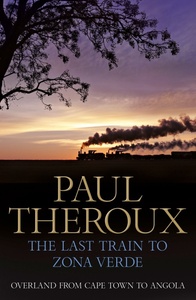Take a photo of a barcode or cover
Paul Theroux is a very analytical travel writer, and this book provides some excellent insights into the issues with economic inequality that plague developing nations. His work has become simultaneously more introspective and more 'big-picture' as he has aged, which gives his tales very valuable depth. I'd highly recommend this book.
adventurous
dark
sad
slow-paced
This book is like being on an uncomfortable trip with your weird, sketchy uncle. I don't know if I'm being too generous giving this two stars; I did actually learn a lot, but it was a struggle. The book lacks focus--apparently the author's intended goal was to make it to Timbuktu, but he only tells you this in the last chapter when it's clear he will fail to make it. For being in Africa, he sure interviews a lot of white people. I would say maybe even mainly white people? It's bordering on Rhodesia nostalgia which is gross. SPEAKING of gross, if the author notices a Black woman or girl he is GOING to tell you what her breasts are like. I'm not sure why the white women don't get the same treatment--maybe he thought they were more likely to read his book? Honestly should probably have stopped at the second or third "heavily-bosomed" woman he sees on a bus, but I was determined to cross Angola off my Around the World project.
sad
medium-paced
A depressing but important read on Africa
adventurous
emotional
informative
reflective
medium-paced
Paul Theroux was a bit lost on this one. I know because he complained about it every other page. 'Why am I here?' is a constant question that pads the text, just as often substituted with, 'What's the point?'
It's fair to say that doubt, both in himself and civilisation as a whole, is a theme that occupies the majority of the book, and though he paws around the dirt to find some answers, in most cases he can only come up with half-hearted justifications for why he would suffer a journey in which he seems to have absolutely no interest. It doesn't make for a compelling read.
Then he arrives in Angola.
I imagine any travelogue requires a certain balance between the writer's subjective experience and a more objective outline of what was seen. Paul Theroux has always been happy to tip that balance towards his personal views, a quality that was rather mundane on this occasion, but in Angola, a country that's rife with injustice, landmines, social inequality, corruption, Chinese opportunists, colonial scars, outrageous characters and decades of war torn misery, in Angola he manages to get out of his own way to create a lucid portrait of madness that makes it a necessary purchase for anybody interested in the refuse of global capitalism.
Just remember, if you do pick up a copy, I don't think you'll be missing out on much by skipping ahead to Chapter 10.
It's fair to say that doubt, both in himself and civilisation as a whole, is a theme that occupies the majority of the book, and though he paws around the dirt to find some answers, in most cases he can only come up with half-hearted justifications for why he would suffer a journey in which he seems to have absolutely no interest. It doesn't make for a compelling read.
Then he arrives in Angola.
I imagine any travelogue requires a certain balance between the writer's subjective experience and a more objective outline of what was seen. Paul Theroux has always been happy to tip that balance towards his personal views, a quality that was rather mundane on this occasion, but in Angola, a country that's rife with injustice, landmines, social inequality, corruption, Chinese opportunists, colonial scars, outrageous characters and decades of war torn misery, in Angola he manages to get out of his own way to create a lucid portrait of madness that makes it a necessary purchase for anybody interested in the refuse of global capitalism.
Just remember, if you do pick up a copy, I don't think you'll be missing out on much by skipping ahead to Chapter 10.
No iron roosters or express trains here. A very misleading title and not the book he intended to write when he started his trip. Probably one of his best books and it's not a happy book. You have to admire him, a 70 year old, taking on a trip alone like this. No trains in this one despite the title-it's the trip not taken-it's all by bus and car. Theroux is quite opinionated, some would say elitist at times-loathes foreign aid, noble Bushmen image, etc... He stays in opulent digs occasionally while mocking himself and others who experience Africa through luxury safaris. But he's more than capable of holding his own in the shanty towns. Lots of soulful reflections on travel, Africa, and himself. He meets some great people, three of whom die during the course of his trip and during the writing of the book. He covers three countries (four if you count the sliver of time and land he was in Botswana): South Africa, Namibia, and Angola. The Zona Verde is the bush-the jungle-the rural Africa. He has a plan but he loves circumstance too and revels in those unforeseen moments of travel when he meets an astonishing person or sees something extraordinary. So many great insightful lines in this book and some are candid and frank, especially about the country of Angola. He's probably persona non grata for life there now. I just watched Anthony Bourdain's CNN show on the Congo. You get a feel for how much parts of Africa are so messed up. The bush is a hard life but it's better than living in a city and that's
the problem with Africa and the world-the exodus of the rural have-nots to mega cities where they have even less-only hope. However, Theroux in his book paints an even better picture with words. In his chapter, "This is What the World Will Look Like When It Ends" the dystopia is alive and well and flourishing in Luanda, Angola. Another chapter has the title, "The Frontier of Bad Karma." Circumstances like terrorism prevented Theroux from finishing his trip to his planned destination, Timbuktu, and it is an experienced traveler who knows when to say when. Even though this trip might be considered a disappointment by some it was another life affirming experience for a guy who had seen everything and done everything but always knows there's something new over the horizon.
the problem with Africa and the world-the exodus of the rural have-nots to mega cities where they have even less-only hope. However, Theroux in his book paints an even better picture with words. In his chapter, "This is What the World Will Look Like When It Ends" the dystopia is alive and well and flourishing in Luanda, Angola. Another chapter has the title, "The Frontier of Bad Karma." Circumstances like terrorism prevented Theroux from finishing his trip to his planned destination, Timbuktu, and it is an experienced traveler who knows when to say when. Even though this trip might be considered a disappointment by some it was another life affirming experience for a guy who had seen everything and done everything but always knows there's something new over the horizon.
This is not your typical heartwarming cultural comedy of errors travel memoir; it sobering, depressing, and at points, downright frightening. Theroux journeys through South Africa, Namibia, Botswana, and Angola to see how much Africa has changed in the ten years he was there last. The verdict? He cuts his trip short. Africa has always been a land of extremes and today it is even more so. There are pricey resorts where people can stay with a herd of elephants, but all of the elephants are in captivity-- not roaming free. Wealthy neighborhoods surrounded by slums and a rising business of slum tourism. Great disparities of racial equality. The iconic lush African landscape juxtaposed against post-apocalyptic cities and villages where electricity and running water are intermittent. English teachers that cannot tell the difference between fiction and nonfiction. The greatest disparity of all is Angola, a country that brings in 1 BILLION dollars every five days from its oil revenue, but about 90% of its population is unemployed and in poverty. While there are glimmers of hope, they are only mere glimmers that are eclipsed by the great socio-political movements of corrupt governments and an uneducated people. Theroux tackles many of the problems facing Africa, looking for answers. Often no answers arise. This is not an easy book to read. It is a cautionary tale of how corruption and economic inequality can destroy a land and its people.
A journey that could have resulted in a fascinating and insightful telling, but spoiled by the author's tedious moaning about his day-to-day hardships and supercilious survey of all he meets. An example of the personalised, anecdotal travelogue genre that National Geographic does so well, but in Theroux's hands in this book badly crafted and delivered without humour or style. The author repeatedly asks a rhetorical question: 'Why am I here?' Indeed.
adventurous
informative
De klager over at Theroux er en sutrekopp og at han har et alt for svartsynt bilde av utviklingen i Afrika. Men greia er at han i motsetning til mange eksperter ikke reiser businessklasse eller kjører hvite landcruisere. I stedet reiser han med lokaltransport, bor der vanlige afrikanere bor og reagerer kraftig mot den fornedrede virkeligheten som både er helt unødvendig og urettferdig. Kritikken er ikke mot Afrika men mot de få som har gravd til seg av fellesskapets goder. Og det har han jo helt rett i - eller hva sier dere, STATOIL?
Han blir ofte spurt på turen om å gi bøker til de boktomme bibliotekene på skoler han besøker. Han svarer alltid det samme: hvorfor spør dere meg? Spør heller den styrtrike politikeren inne i Luanda som har mer enn nok penger å bidra med.
Dette sitatet formidler grunnholdningen til Theroux i denne boken, og jeg vil forsvare hans sinne. Det springer ut fra en dyp kjærlighet til et kontinent han kjenner bedre enn de fleste av oss.
I ask the political economists and the moralists if they have ever calculated the number of individuals who must be condemned to misery, overwork, demoralisation, infamy, rank ignorance, overwhelming misfortune and utter penury to produce one rich man.
- João Baptista da Silva de Almeida Garrett, sitert hos José Saramego
Jeg vet at en del kritiserer Theroux for hans syn på Afrika. Men hans syn er ikke synet av hverdagsmenneskene, men av gribbene i mange fasonger som suger beinmargen ut av det rikeste kontinentet.
Han blir ofte spurt på turen om å gi bøker til de boktomme bibliotekene på skoler han besøker. Han svarer alltid det samme: hvorfor spør dere meg? Spør heller den styrtrike politikeren inne i Luanda som har mer enn nok penger å bidra med.
Dette sitatet formidler grunnholdningen til Theroux i denne boken, og jeg vil forsvare hans sinne. Det springer ut fra en dyp kjærlighet til et kontinent han kjenner bedre enn de fleste av oss.
I ask the political economists and the moralists if they have ever calculated the number of individuals who must be condemned to misery, overwork, demoralisation, infamy, rank ignorance, overwhelming misfortune and utter penury to produce one rich man.
- João Baptista da Silva de Almeida Garrett, sitert hos José Saramego
Jeg vet at en del kritiserer Theroux for hans syn på Afrika. Men hans syn er ikke synet av hverdagsmenneskene, men av gribbene i mange fasonger som suger beinmargen ut av det rikeste kontinentet.





